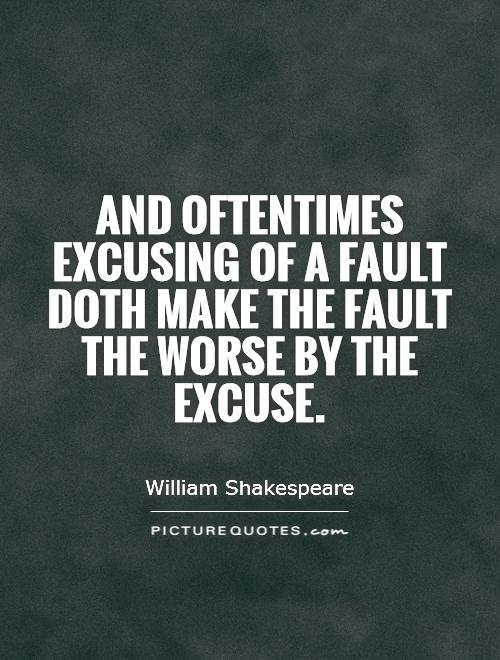And oftentimes excusing of a fault doth make the fault the worse by the excuse

And oftentimes excusing of a fault doth make the fault the worse by the excuse
In William Shakespeare's works, the theme of accountability and responsibility is a recurring motif that is explored in various ways. One of the most famous quotes that delves into this theme is "And oftentimes excusing of a fault doth make the fault the worse by the excuse." This line, spoken by the character of King John in the play of the same name, highlights the idea that making excuses for one's mistakes can actually exacerbate the wrongdoing rather than mitigate it.Shakespeare often delves into the complexities of human nature and the consequences of our actions. In this particular quote, he is suggesting that when we try to justify or excuse our faults, we are not taking full responsibility for our actions. By deflecting blame or making excuses, we are essentially avoiding the consequences of our behavior and refusing to acknowledge the harm that we have caused.
This idea is further explored in many of Shakespeare's plays, where characters who refuse to take responsibility for their actions often face dire consequences. For example, in "Macbeth," the titular character's downfall is a result of his inability to take ownership of his ambition and the actions he takes to achieve his goals. Similarly, in "Othello," the tragic hero's jealousy and insecurity lead him to make excuses for his actions, ultimately leading to his own demise.
The quote also speaks to the idea of integrity and honesty. By making excuses for our faults, we are essentially lying to ourselves and others about the true nature of our actions. This lack of honesty can erode trust and credibility, leading to further problems down the line.
Overall, Shakespeare's exploration of the idea that excusing a fault can make it worse serves as a cautionary tale about the importance of taking responsibility for our actions and facing the consequences of our behavior head-on. It is a timeless lesson that continues to resonate with audiences today.












 Friendship Quotes
Friendship Quotes Love Quotes
Love Quotes Life Quotes
Life Quotes Funny Quotes
Funny Quotes Motivational Quotes
Motivational Quotes Inspirational Quotes
Inspirational Quotes